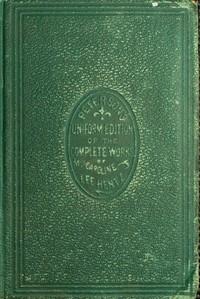|
|
Read this ebook for free! No credit card needed, absolutely nothing to pay.Words: 101737 in 18 pages
This is an ebook sharing website. You can read the uploaded ebooks for free here. No credit cards needed, nothing to pay. If you want to own a digital copy of the ebook, or want to read offline with your favorite ebook-reader, then you can choose to buy and download the ebook.

: Love After Marriage; and Other Stories of the Heart by Hentz Caroline Lee - Fiction; Short stories American@FreeBooksWed 07 Jun, 2023 Appendix, 463 THE LILY AND THE TOTEM. THE FIRST VOYAGE OF RIBAULT. Introduction--The Huguenots--Their Condition in France--First Expedition for the New World, under the auspices of the Admiral Coligny, Conducted by John Ribault--Colony Established in Florida, and confided to the charge of Captain Albert. It is not so generally known that the colonies of the Huguenots, in the new world, were almost coeval with those of the Spaniards. They anticipated them in the northern portions of the continent. These settlements were projected by the active genius of the justly-celebrated French admiral, Gaspard de Coligny, one of the great leaders of the Huguenots in France. His persevering energies, impelled by his sagacious forethought, effected a beginning in the work of foreign colonization, which, unhappily for himself and party, he was not permitted to prosecute, with the proper vigor, to successful completion. His sagacity led him to apprehend, from an early experience of the character of the Queen-mother, in the bigoted and brutal reign of Charles the Ninth, that there would, in little time, be no safety in France for the dissenters from the established religion. The feebleness of the youthful Prince, the jealous and malignant character of Catharine--her utter faithlessness, and the hatred which she felt for the Protestants, which no pact could bind, and no concession mollify,--to say nothing of the controlling will of Pius the Fifth, who had ascended the Papal throne, sworn to the extermination of all heresies,--all combined to assure the Protestants of the dangers by which their cause was threatened. The danger was one of life as well as religion. It was in the destruction of the one, that the enemies of the Huguenots contemplated the overthrow of the other. Coligny was not the man to be deceived by the hollow compromises, the delusive promises, the false truces, which were all employed in turn to beguile him and his associates into confidence, and persuade them into the most treacherous snares. He combined a fair proportion of the cunning of the serpent with the dove's purity, and, maintaining strict watch upon his enemies, succeeded, for a long period, in eluding the artifices by which he was overcome at last. Availing himself of the influence of his position, and of a brief respite from that open war which preceded the famous Edict of January, 1562, by which the Huguenots were admitted, with some restrictions, to the exercise of their religion, Coligny addressed himself to the task of establishing a colony of Protestants in America. He readily divined the future importance, to his sect, of such a place of refuge. The moment was favorable to his objects. The policy of the Queen-mother was not yet sufficiently matured, to render it proper that she should oppose herself to his desires. Perhaps, she also conceived the plan a good one, which should relieve the country of a race whom she equally loathed and dreaded. It is possible that she did not fully conjecture the ultimate calculations of the admiral. The king, himself, was a minor, entirely in her hands, who could add nothing to her counsels, or, for the present, interfere with her authority; and, without seeking farther to inquire by what motives she was governed in according to Coligny the permission which he sought, it is enough that he obtained the necessary sanction. Of this he readily availed himself. It was not, by the way, his first attempt at colonization. Having in view the same objects by which he was governed in the present instance, he had, in 1555, sent out an expedition to Brazil under Villegagnon. This enterprise had failed through the perfidy of that commander. Its failure did not discourage the admiral. Though the full character of Catharine had not developed itself, in all its cruel and heartless characteristics, it was yet justly understood by him, and he never suffered himself to forget how necessary to the sect which he represented was the desired haven of security which he sought, in a region beyond her influence. The woods were "full of many beastes, as stags, deere and hares, and likewise of lakes and pooles of fresh water, with great plentie of fowles, convenient for all kinde of pleasant game." The air was "goode and wholesome, temperate between hot and colde;" "no vehement windes doe blowe in these regions, and those that do commonly reigne are the southwest and west windes in the summer season;" "the skye cleare and faire, with very little raine; and if, at any time, the ayre be cloudie and mistie with the southerne winde, immediately it is dissolved and waxeth cleare and faire againe. The sea is calme, not boisterous, and the waves gentle." And the people were like their climate. The nature which yielded to their wants, without exacting the toil of ever-straining sinews, left them unembittered by necessities which take the heart from youth, and the spirit from play and exercise. No carking cares interfered with their humanity to check hospitality in its first impulse, and teach avarice to withhold the voluntary tribute which the natural virtues would prompt, in obedience to a selfishness that finds its justification in serious toils which know no remission, and a forethought that is never permitted to forget the necessities of the coming day. Verazzani found the people as mild and grateful as their climate. They crowded to the shore as the stranger ships drew nigh, "making divers synes of friendship." They showed themselves "very courteous and gentle," and, in a single incident, won the hearts of the Europeans, who seldom, at that period, in their intercourse with the natives, were known to exhibit an instance so beautiful, of a humanity so Christian. A young sailor, attempting to swim on shore, had overrated his strength. Cast among the breakers, he was in danger of being drowned. This, when the Indians saw, they dashed into the surf, and dragged the fair-skinned voyager to land. Here, when he recovered from his stupor, he exhibited signs of the greatest apprehension, finding himself in the hands of the savages. But his lamentations, which were piteously loud, only provoked theirs. Their tears flowed at his weeping. In this way they strove to "cheere him, and to give him courage." Nor were they neglectful of other means. "They set him on the ground, at the foot of a little hill against the sunne, and began to behold him with great admiration, marveiling at the whitenesse of his fleshe;" "Putting off his clothes, they made him warme at a great fire, not without one great feare, by what remayned in the boate, that they would have rosted him at that fire and have eaten him." But the fear was idle. When they had warmed and revived the stranger, they reclothed him, and as he showed an anxiety to return to the ship, "they, with great love, clapping him fast about with many embracings," accompanied him to the shore, where they left him, retiring to a distance, whence they could witness his departure without awakening the apprehensions of his comrades. These people were of "middle stature, handsome visage and delicate limmes; of very little strength, but of prompt wit." We need not pursue the details of these earlier historians. They suffice to direct attention to Florida, and to persuade adventure with fanciful ideas of its charming superiority over all unknown regions. But the adventurers, until Coligny's enterprise was conceived, meditated the invasion of the country, and the gathering of its hidden treasures, rather than the establishment of any European settlements in its glorious retreats. It was not till the eighteenth day of February, in the Year of Grace, one thousand five hundred and sixty-two, that the plan of the Admiral of France was sufficiently matured for execution. On that day he despatched two vessels from France, well manned and furnished, under the command of one John Ribault, for the express purpose of making the first permanent European establishment in these regions of romance. The narrative of this enterprise is chiefly drawn from the writings of Ren? Laudonniere, who himself went out as a lieutenant in the expedition. Laudonniere, in his narrative of their progress, says nothing of the secret objects of Coligny, of which he probably knew nothing. He ascribes to the King--the Queen-mother, rather--a nobler policy than either of them ever entertained. "My Lord of Chastillon," thus he writes,--"A nobleman more desirous of the publique than of his private benefits, understanding the pleasure of the King, his Prince, which was to discover new and strange countries, caused vessels for this purpose to be made ready with all diligence, and men to be levied meet for such an enterprise." Charlevoix describes Ribault as "un ancien officier de marine," and speaks of him as a man of experience and "Z?l? Huguenot." Of his vessels, on this expedition, he says that they belonged to the class called "Roberges, et qui differoient peu des Caravelles Espagnoles." But this question need not detain us. Laudonniere speaks of the armament as ample for the purpose for which it was designed--"so well furnished with gentlemen and with oulde souldiers that he had meanes to achieve some notable thing, and worthie of eternall memorie." This was an exaggeration, something Spanish in its tenor,--one of those flourishes of rhetoric among the voyagers of that day, which had already grown to be a sound without much signification. The vessels were small, as was the compliment of men dispatched. The objects of the expedition were limited, did not contemplate exploration but settlement, and, consequently, were not likely to find opportunity for great enterprises. The voyage occupied two months; the route pursued carefully avoided that usually taken by the Spaniards, whom already our adventurers had cause to fear. At the end of this period, land was made in the latitude of St. Augustine, to the cape of which they gave the name of St. Fran?ois. From this point, coasting northwardly, they discovered "a very faire and great river"--the San Matheo of the Spaniards, now the St. John's, to which Ribault, as he discovered it on the first of May, gave the name of that month. This river he penetrated in his boats. He was met on the shore by many of the natives, men and women. These received him with gentleness and peace. Their chief man made an oration, and honored Ribault, at the close, with a present of "chamois skinnes." On the ensuing day, he "caused a pillar of hard stone to be planted within the sayde river, and not farre from the mouth of the same, upon a little sandie knappe," on which the arms of France were engraved. Crossing to the opposite shores of this river, a religious service was performed in the presence of the Indians. There the red-men, perhaps for the first time, beheld the pure and simple rites of the genuine Christian. Prayers were said, and thanks given to the Deity, "for that, of his grace, hee had conducted the French nation into these strange places." This service being ended, the Indians conducted the strangers into the presence of their king, who received them in a sitting posture, upon a couch made of bay leaves and palmetto. Speeches were made between the parties which were understood by neither. But their tenor was amicable, the savage chieftain giving to Ribault, at parting, a basket wrought very ingeniously of palm leaves, "and a great skinne painted and drawen throughout with the pictures of divers wilde beastes; so livly drawen and portrayed that nothing lacked life." Fish were taken for the Frenchmen by the hospitable natives, in weirs made of reeds, fashioned like a maze or labyrinth--"troutes, great mullets, plaise, turbots, and marvellous store of other sorts of fishes altogether different from ours." Another chief upon this river received them with like favors. Two of the sons of this chief are represented as "exceeding faire and strong." They were followed by troops of the natives, "having their bowes and arrowes, in marveilous good order." Laudonniere, in Hakluyt, gives the regal title among the Floridians as Paracoussi. Charlevoix writes the word Paraousti, or Paracousti; "et ausquels les Castillans donnent le titre g?n?ral de Caciques." Mico, in subsequent periods, seems to have been the more popular title among the Florida Indians, signifying the same thing, or its equivalents, Chief, Prince, or Head Warrior. From this river, still pursuing a northwardly course, Ribault came to another which he explored and named the Seine, because it appeared to resemble the river of that name in France. We pass over the minor details in this progress--how he communed with the natives--who, everywhere seemed to have entertained our Huguenots with equal grace and gentleness, and who are described as a goodly people, of lively wit and great stature. Ribault continued to plant columns, and to take possession of the country after the usual forms, conferring names upon its several streams, which he borrowed for the purpose from similar well-known rivers in France. Thus, for a time, the St. Mary's became the Seine; the Satilla, the Somme; the Altamaha, the Loire; the Ogechee, the Garonne; and the Savannah, the Gironde. The river to which his prows were especially directed, was that to which the name of Jordan had been given by Vasquez de Ayllon, some forty years before. This is our present Combahee. In sailing north, in this search, other smaller rivers were discovered, one of which was called the Belle-a-veoir. Separated by a furious tempest from his pinnaces, which had been kept in advance for the purpose of penetrating and exploring these streams, Ribault, with his ships, was compelled to stand out to sea. When he regained the coast and his pinnaces, he was advised of a "mightie river," in which they had found safe harborage from the tempest, a river which, "in beautie and bignesse" exceeded all the former. Delighted with this discovery, our Huguenots made sail to reach this noble stream. The object of Ribault had been some safe and pleasant harborage, in which his people could refresh themselves for a season. His desires were soon gratified. He cast anchor at the mouth of a mighty river, to which, "because of the fairnesse and largenesse thereoff," he gave the name of Port Royale, the name which it still bears. The depth of this river is such, that, according to Laudonniere, "when the sea beginneth to flowe, the greatest shippes of France, yea, the argosies of Venice, may enter there." Ribault, at the head of his soldiers, was the first to land. Grateful, indeed, to the eye and fancy of our Frenchmen, was the scene around them. They had already passed through a fairy-like region, of islet upon islet, reposing upon the deep,--crowned with green forests, and arresting, as it were, the wild assaults of ocean upon the shores of which they appeared to keep watch and guard. And, passing between these islets and the main, over stillest waters, with a luxuriant shrubbery on either hand, and vines and flowers of starred luxuriance trailing about them to the very lips of this ocean, they had arrived at an imperial growth of forest. The mighty shafts that rose around them, heavy with giant limbs, and massed in their luxuriant wealth of leaves, particularly impressed the minds of our voyagers--"mightye high oakes and infinite store of cedars," and pines fitted for the masts of "such great ammirals" as had never yet floated in the European seas. Their senses were assailed with fresh and novel delights at every footstep. The superb magnolia, with its great and snow-white chalices; the flowering dogwood with its myriad blossoms, thick and richly gleaming as the starry host of heaven; the wandering jessamine, whose yellow trophies, mingling with grey mosses of the oak, stooped to the upward struggling billows of the deep, giving out odor at every rise and fall of the ambitious wavelet,--these, by their unwonted treasures of scent and beauty, compelled the silent but profound admiration of the strangers. "Exceeding pleasant" did the "very fragrant odour" make the place; while other novelties interposed to complete the fascinations of a spot, the peculiarities of which were equally fresh and delightful. Their farther acquaintance with the country only served to increase its attractions. As they wandered through the woods, they "saw nothing but turkey cocks flying in the forests, partridges, gray and red, little different from ours, but chiefly in bignesse;"--"we heard also within the woods the voices of stagges, of beares, of hyenas, of leopards, and divers other sorts of beasts unknown to us. Being delighted with this place, we set ourselves to fishing with nets, and caught such a number of fish that it was wonderful." Free books android app tbrJar TBR JAR Read Free books online gutenberg More posts by @FreeBooks
: Heinosen perhe huvimatkalla Huvinäytelmä 2:ssa näytöksessä by Hodell Frans - Swedish drama Translations into Finnish@FreeBooksWed 07 Jun, 2023
|
Terms of Use Stock Market News! © gutenberg.org.in2025 All Rights reserved.






